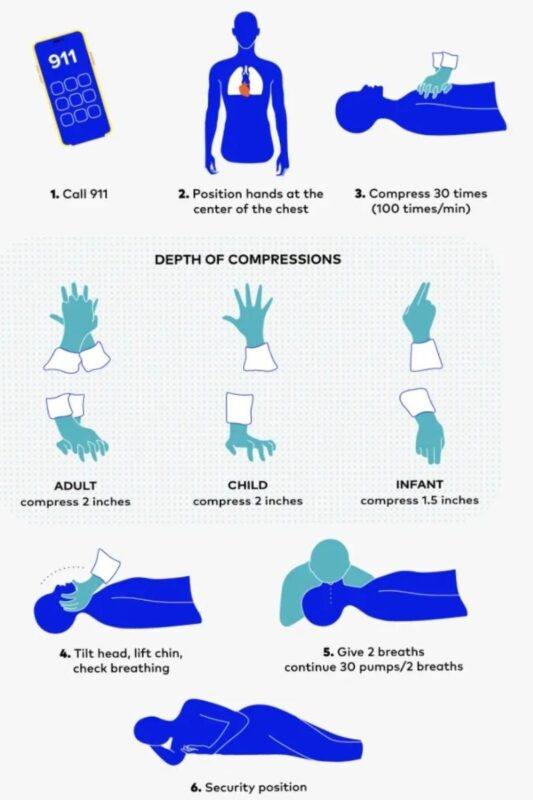How To Identify A Sudden Cardiac Arrest? All That You Need To Know.
Sudden Cardiac Arrest
Cardiovascular disease (CVD) prevalence has increased significantly over the last decade, and heart-related ailments among young people have recently become a source of concern for health professionals.
In recent years, we have seen an increase in the number of deaths caused by cardiac arrest. Worse, the large percentage of them were below the age of 45. These incidents compelled us to consider why sudden cardiac arrest in young people has become such a common occurrence.
Indians have a higher genetic predisposition for heart disease. According to the Indian Heart Association, heart disease strikes Indians at a younger age than other demographics, and often without warning.
First and foremost, it is crucial to understand Sudden Cardiac Arrest and how it differs from a Heart Attack…
- A blockage in one or more of your coronary arteries causes a heart attack (Myocardial Infarction), which stops blood flow to the heart. A heart attack is the death of heart muscle tissue caused by a lack of blood supply. It’s a “circulation” issue.
- In contrast, cardiac arrest occurs when the heart’s electrical system fails. The heart ceases to beat normally. The heart’s pumping function has been “arrested,” or has ceased.
The heart is unable to pump blood to the rest of the body, including the brain and lungs, during cardiac arrest. Without medical assistance or intervention, death can occur in minutes, and most studies indicate that approximately 9 out of 10 people who have a cardiac arrest end up dying before they could reach a hospital.
Cardiac Arrest Signs and Symptoms:
In case of majority of people, a cardiac arrest occurs without a warning. Some people, however, do experience some warning signs prior to a cardiac arrest.
Some of the warning signs may be as listed below:
- Palpitations
- Dizziness
- Breathlessness
- Chest discomfort / Pain
- Fainting
The ones who had an earlier episode of Cardiac Arrest previously might experience the following:
- Unresponsive
- Unconscious
- Not breathing
The main causes leading to a cardiac arrest.
Any condition that strains or damages the heart can raise the chances of sudden death.
These are the two most prevalent heart-related causes….
- Previous heart attack: The probability of sudden cardiac death is significantly high in the six months following a heart attack.
- Coronary artery disease, also known as ischemic heart disease. It is responsible for almost 80% of all sudden cardiac deaths.
Other causes of cardiovascular disease are:
- Previous history of Sudden Cardiac Arrest episodes.
- Family history of death due to Sudden Cardiac Arrest.
- Personal / Family history of certain abnormal heart rhythms, such as long QT syndrome, Wolff-Parkinson-White syndrome, ventricular tachycardia, after-heart-attack ventricular tachycardia or ventricular fibrillation.
- History of heart defects or blood vessel abnormalities since birth (congenital).
- Syncope’s History (fainting episodes of unknown cause).
- Heart failure (a condition in which the pumping power of your heart is less than normal). People with heart failure are 6 to 9 times more likely than the general population to experience ventricular arrhythmias, which can result in sudden cardiac arrest.
- Dilated cardiomyopathy (which accounts for about 10% of all sudden cardiac deaths). Scarring and damage to the heart muscle increase the likelihood of abnormal heart rhythms, which might lead to heart attacks.
- Hypertrophic cardiomyopathy (thickening of the heart muscle which affects your ventricles).
The other risk factors are;
- Respiratory arrest: If a person stops breathing, cardiac arrest will occur unless they receive immediate treatment. Respiratory arrest can occur as a result of choking, drowning, trauma, drug overdose, or poisoning. Respiratory arrest can be caused by a variety of medical conditions, including pneumonia and seizure disorders.
- Changes in potassium and magnesium levels in the blood.
- Obesity.
- Diabetes.
- Alcohol and recreational drug use
- Taking “pro-arrhythmic” drugs may increase the risk of life-threatening arrhythmias. Some antibiotics, diuretics, and heart medications, for example, can exacerbate arrhythmias.
- High blood pressure and cholesterol levels
- Obesity, smoking, and sedentary behaviour are examples of lifestyle factors.
- Blunt chest injury. Commotio cordis refers to a hard hit to the chest that results in sudden cardiac death. Athletes who are hit hard in the chest by sports equipment or another player may develop commotio cordis. This condition has no effect on the heart muscle. Instead, it alters the electrical signalling of the heart. If the blow to the chest occurs at a specific point in the signalling cycle, it can induce ventricular fibrillation.
What can trigger a Cardiac Arrest?
An activity or behaviour can sometimes end up causing a cardiac arrest. People with heart conditions or other risk factors are more likely to experience triggering events.
Potential triggers include:
- Excessive alcohol consumption or binge drinking
- Physical effort or stress, including competitive sports: One out of every three cardiac arrests in athletes occurred while they were resting or sleeping after activity. Cardiomyopathy and, on rare occasions, conduction disorders such as long QT syndrome can cause cardiac arrest during exercise or sleep. Regular physical activity, on the other hand, reduces the risk of cardiac arrest.
- Recent cocaine, amphetamine, or marijuana use
- Extensive consumption of Coffee: This is more common in people who are not regular coffee drinkers. Coffee drinkers should try to limit their daily consumption to no more than six 5-ounce cups. Taking too much caffeine in the form of powders, pills, or energy drinks can also result in a cardiac arrest.
- Extreme emotional stress in the preceding month
Managing Sudden Cardiac Arrest
If you see someone falling to the ground and suspect sudden cardiac arrest, call emergency services right away.
A person in cardiac arrest can be saved if they are treated immediately with cardiopulmonary resuscitation (CPR) and defibrillation.
The critical step in the management of SCA is to perform Cardiopulmonary Resuscitation (CPR) within the first 6 minutes. This increases the chances of survival significantly because it immediately reboots heart and restores blood supply to the brain.

CPR, which is a set of chest compressions accompanied by blowing into the airway of the patient, can help revive patients or at least keep them alive until expert medical help is available.
A defibrillator is a device that sends an electric shock to the heart to try to restore its normal rhythm. Most people who have a cardiac arrest do not receive treatment quickly enough to survive
Preventing Sudden Cardiac Arrest
Some of the ways to reduce risk are as follows:
- Keeping regular follow-up appointments with your healthcare provider.
- Keeping regular follow-up appointments with your healthcare provider.
- Staying away from alcohol, smoking, and other tobacco products.
- Taking medications prescribed by your doctor for high cholesterol or arrhythmia.
- If your doctor recommends it, get an implantable cardioverter defibrillator (ICD).
- If your doctor has advised you to undergo specific procedures or surgery, such as angioplasty or catheter ablation. Then it is preferable to complete it at the appropriate time.
- Taking genetic testing if your doctor recommends it to look for potential causes of sudden cardiac death.
- Educating your family on the importance of prompt medical attention and learning CPR.
- Avoid heavy exercises without a precardiac checkup…..many young people begin an exercise regimen at their gym without a precardiac check-up and even engage in exercises such as weight training, which increases the thickness of the heart wall and causes changes in the heart’s electrical system, resulting in fast or irregular heartbeats. Some even consume supplements that are harmful to the heart and cause arrhythmia (irregular or abnormal heartbeat).”
Also do keep in mind that regular health check-up is needed for anyone who has;
- Unknown cause of fainting (syncope). Fainting while doing something or exercising could indicate a heart problem.
- Chest pain or shortness of breath. These symptoms could indicate a heart problem. They can, however, be caused by asthma, so it’s critical to get a thorough health evaluation.
- A history of sudden cardiac death in the family. A family history of sudden cardiac death increases a person’s chances of experiencing the same type of heart event. If there is a family history of unexplained deaths, talk to your doctor about screening options.
The number of young adults dying suddenly from cardiac arrest is continuing to increase. Cardiovascular diseases are caused by a variety of risk factors, including ethnicity, genetics, smoking habits, diet, lack of physical activity, cholesterol level, high blood pressure, diabetes, and depression. Some of these risk factors are beyond our control, but what we eat, how much we exercise, and how our mental health is can all be modified with the right lifestyle choices.
Most people who have a sudden cardiac arrest outside of a hospital do not survive (about 90%). This is usually due to a lack of timely assistance. The quicker emergency measures such as CPR and defibrillation are administered, the better the chances of survival and good health outcomes.




